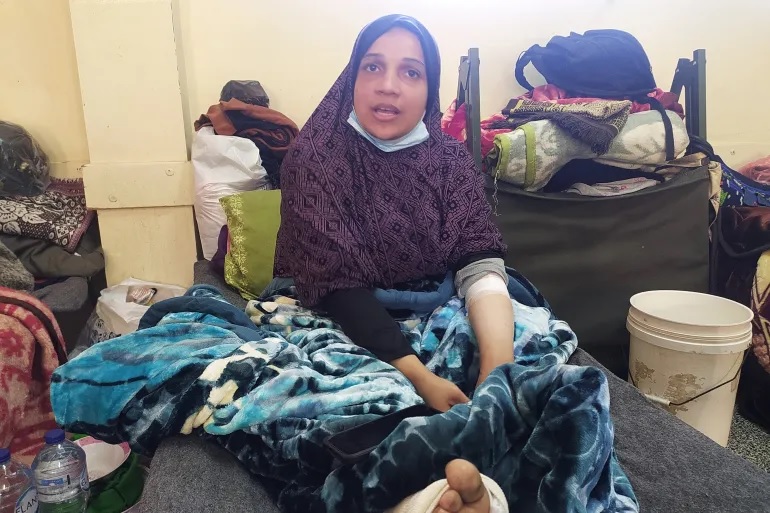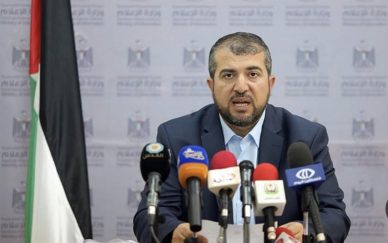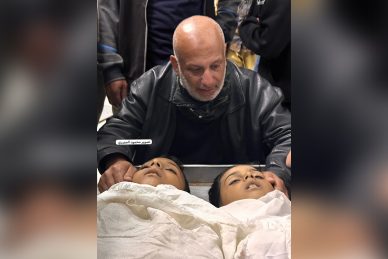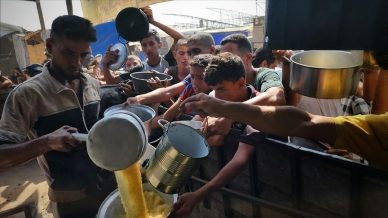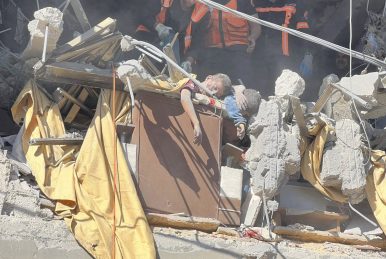GAZA, (PIC)
Wala’a Mas’oud will not fulfill her promise to celebrate her only son Kareem’s birthday when the Israeli war on the Gaza Strip ends. He was killed by intense airstrikes that destroyed an entire residential block in Jabalia refugee camp in the northern part of the Strip.
These airstrikes took place on October 31st, one day after Kareem’s fifth birthday. His mother told Al Jazeera, “He was happy, but the circumstances were not suitable to fulfill his request for a birthday celebration. I promised him that I would hold him a big party after the war.”
Kareem is the only child of this thirty-year-old mother, who, along with her husband Abdul Aziz Ward, suffers from a problem hindering their ability to have another child, which Kareem longed for. He would often ask them, “Why don’t I have a brother?”
The couple gave birth to Kareem about a year after their marriage, and they subsequently experienced difficulty conceiving another child. They had a prearranged appointment to travel to Egypt for medical tests in the hope of having another child. According to Wala’a, “We were waiting for Kareem’s passport to be issued so he could accompany us on the trip, which was scheduled for the fifth day of the war.”
Life is difficult without Kareem
Kareem dreamed of becoming a doctor, and his parents describe him as “intelligent, committed to prayer and Quran reading, and interested in participating in discussions on topics beyond his age.” His father, Abdul Aziz, told Al Jazeera, “Kareem loved pizza, but in his final days, he survived on very little water and canned food.”
Israel has isolated the city of Gaza and the northern part of the Strip from its southern region since launching its ground operation and incursion into densely populated areas, preventing all supplies and humanitarian needs from reaching the remaining residents in those areas. Hundreds of thousands of people were forced to flee southward under threat and bombardment.
With tears in her eyes, and alongside her husband Abdul Aziz, who displays pictures of Kareem that he keeps on his mobile phone, Wala’a says, “It is difficult to return to life without Kareem.”
This small, humble modest family lived in the Safatawi area in northern of Gaza City and sought refuge with relatives in “Block 6” in Jabalia camp, the most densely populated among the eight refugee camps in the Strip.
Just a few days after Wala’a and her husband Abdul Aziz fled with their only son Kareem, that area became the scene of a massacre that rivaled the bloodshed committed by the Israeli army at the “Al-Ma’madani Hospital.” Fighter jets carried out intense airstrikes that destroyed an entire residential block and, according to the Ministry of Health’s documentation, killed and injured around a thousand of its residents.
The entire family of Wala’a (13 members) was martyred when their house collapsed on top of them. At that moment, Wala’a was with Abdul Aziz and Kareem just a few meters away in another house belonging to one of her uncles, which was also completely destroyed. Wala’a describes spending about an hour buried under the rubble, saying, “I kept repeating the Shahada (Islamic declaration of faith) and thought that I was a martyr.”
Through his own efforts and determination to survive, Abdul Aziz managed to remove the debris and escape from under the rubble. He helped the rescuers, including volunteers and civil defense personnel, in rescuing others, including his wife Wala’a. However, he had no knowledge of Kareem’s fate. He searched for him in the Indonesian hospital and was devastated when his eyes fell upon a small shroud among a large number of shrouded martyrs’ bodies. Written on it in black ink was “Martyr Kareem Abdul Aziz Ward.”
Some relatives of Wala’a and her husband are still trapped under the rubble of their destroyed homes, and the civil defense teams have been unable to rescue them. Wala’a, along with her husband and the remaining relatives, was forced to flee southward following intense and violent airstrikes on the Indonesian hospital where she was receiving treatment.
Wala’a survived death for the second time. She recalls the terrifying days at the Indonesian hospital, which came under aerial and artillery attacks. The room’s ceiling collapsed onto her body, and she narrowly escaped a fatal injury when a piece of shrapnel penetrated the window. In a neighboring room, several wounded individuals were martyred as rockets and shells scattered inside.
Now, Wala’a lies on a dilapidated bed in the Jenin High School near the European Gaza Hospital in the northeastern city of Rafah. Her leg is wrapped in a cast, as she suffered fractures from a concrete column falling on her. She complains about the deteriorating medical care and fears that she may not be able to walk on her feet again.
During the journey from the Indonesian hospital in the northern area of the Gaza Strip to the south, where Wala’a found herself in a school due to the lack of available space in hospitals, she stood on her feet for about six hours despite her pain and injuries. The Israeli army forced the hospital administration to evacuate hundreds of wounded and patients in only four buses, each with a capacity of 50 passengers. Wala’a says, “The bus was like a sardine can,” referring to the extreme overcrowding.
Wala’a lives as a captive of her pain and the sorrow of losing her only son Kareem and her entire family. She says she is unable to think about what the future holds and wishes that she had died and joined the martyrs.

